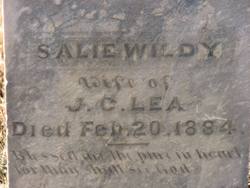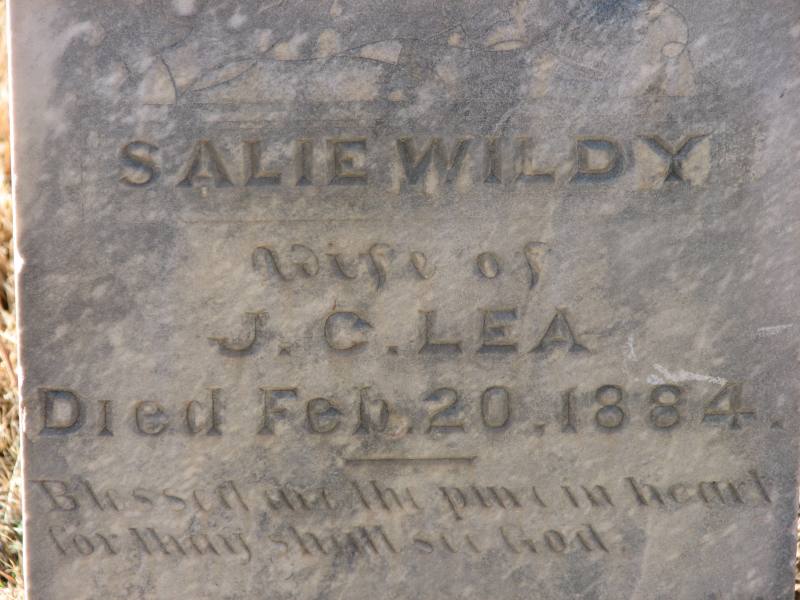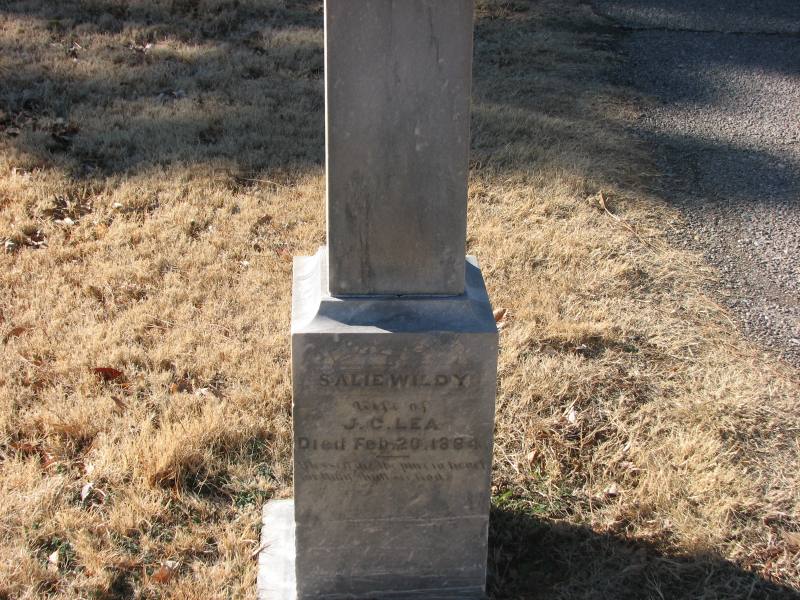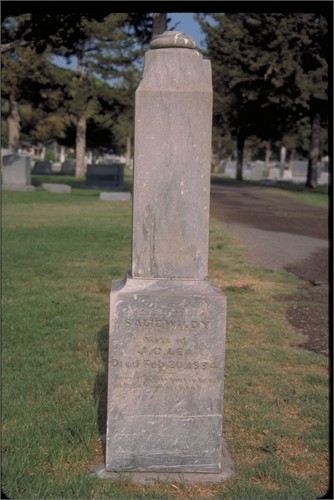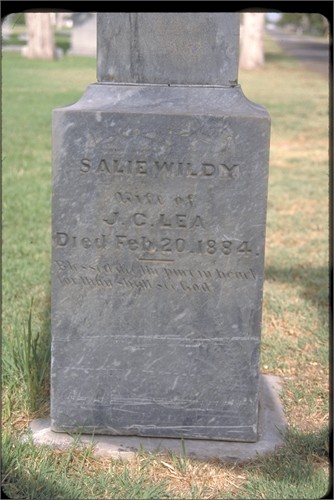Stepfather: Elijah Robertson Childress
Mother: Laurena Matilda "Rena"(Hall) Childress Wildy.
Spouse: Joseph Callaway Lea, married on 3 Feb 1875, Yazoo Co, MS
More on Lea: From Vignettes, of the Civil War, by B. Francis McRae Ward
Captain Joseph Calloway Lea is known, and spoken of, as the father of Roswell, New Mexico, and the founder of the New Mexico Military Institute. He was born November 8, 1841 in Cleveland, Tennessee. On February 4, 1904, he died of pneumonia in Roswell.
Captain Lea's parents were Dr. Pleasant J. G. Lea, and Lucinda (Calloway) Lea, both highly respected in their community. In 1849, Dr. Lea and his family left Tennessee and moved to Lea's Summit, Missouri and settled there. Lea's Summit was named in honor of Dr. Lea, (but the name was changed to Lee's Summit in later years). Dr. Lea was very successful in his profession and in farming. Although educational advantages were limited during the time, his children took advantage of the educational opportunities available, and Dr. Lea. instilled in them the very highest principles of honor and character.
In the Early part of 1862, a band of Kansas Redlegs appeared in Dr. Lea's front yard. When Dr. Lea came out to inquire what they wanted they shot him through the heart, burned his home and took his fine driving horses.
Joseph Lea and his younger brother Frank, were helpful and energetic on the farm and still just mere boys, hadn't given too much thought to the long hard struggle immediately ahead, until one morning in December, 1861, while gathering corn in their father's field they were arrested by a band of Kansas border soldiers. The Kansas soldiers had a number of captives with them, but the Lea boys made their escape just before the others were shot and killed. Like many other young men of Missouri, Joe and Frank Lea realized it wasn't safe for them to remain at home, so they cast their lot with the Confederacy in the Sixth Missouri Regiment of General Joseph Orville (Jo) Shelby's brigade. In view or all historical evidence Captain Lea, indeed, played a great part in the long hard struggle. Because of his distinguished military duty as a captain the title always remained with him, but he was promoted to a colonel before the end of the third year of his service. Captain Lea was a handsome, brave, daring officer, and was constantly looking out for the safety and protection of his men, and this was especially true where his close personal friends were concerned. A vacancy occurred for replacement of a first lieutenant, and his old friend Jason James wanted to fill the place and, feeling hurt about Captain Lea not responding to his request, James asked Lea why he didn't give him the promotion, and Lea replied: "James I love you too well to put you in a place where I know you will get killed."
When the war came to an end Captain Lea went to Georgia to live where he became engaged in railroad construction, and cotton planting. He lived in Georgia for a short period of time, then removed to Mississippi.
In 1877 Captain Lea married Mrs. Douglas Burbridge, who passed away about four years after their marriage. In 1875, he married Miss Sallie Wildy, of Satartia (Yazoo County), Mississippi. Two children were born to them, a son, Harry Wildy Lea, and a daughter, Ella Lea, the first child of Anglo-American parentage born where the City of Roswell now stands, and Ella is married to Hiram M. Dow, a prominent Roswell attorney. Captain and Mrs. Lea came to Colfax County, New Mexico in 1876, and moved to Roswell in 1877. In 1884, Mrs. Lea died, and in 1889, Captain Lea married Mrs. Mabel Doss Day of Coleman, Texas, and she died in April 1906, about two years after her husbands death.
When Captain Lea came to Roswell (Lincoln County) New Mexico, the country was new and wild; full of savages and lawless white men, and "the only law was one of might and the six shooter." There were not many settlers in the Territory; a few white people lived at Missouri Plaza on the Hondo, and a good many Mexicans lived on the Berrendo; most of the country was a wilderness. During the Lincoln County War, (a feud between two factions) Captain Lea remained neutral. He told them emphatically if he had any fighting of his own to do he was man enough to cover his own ground--and there was no trouble or interference with his decision. He wanted to see the Territory grow and develop; he became the outstanding leader of Roswell and the region surrounding it; he donated the ground the City now stands on; he was Blest with pride, patriotism, and honor, and was loved by everyone.
In order for Roswell and the surrounding country to grow arid prosper, Captain Lea knew it was necessary for law and order to prevail. Pat Garrett, the famous sheriff of the West, who killed Billy the Kid, left Claiborne Parish, Louisiana on horseback in the 1870s, covered the long trek to the Territory and settled in the Pecos Valley. When tie arrived in the Territory Captain Lea persuaded him to come to Lincoln County and advised him to make land investments in the vicinity of Roswell which later became very valuable, and in 1800 Garrett was elected Sheriff of Lincoln County and his services in that capacity were valuable and useful to the community. The lawless element disappeared and a peaceful cultural atmosphere prevailed.
Captain Lea had unusual foresight and great faith in land values and cattle. In the new country there was no mistake about the wonderful climate, the rich productive soil, good water supply, and affluent of all the necessary elements for growing fine cattle. In the 1870s Captain Lea turned most of his attention to the operation of a large mercantile business, which grew into the leading establishment of the great Pecos Valley.
Van C. Smith and his partner, Aaron Wilburn, came to the site occupied by the City of Roswell today in 1868 or 1869. Smith acquired the land incorporated in the present City of Roswell, March 4, 1871, and acquired more land October 14th the same year. Other lands were acquired shortly after by Marion Turner and Aaron Wilburn. Smith was known throughout the region as a reformed gambler, but he raised game chickens and instigated chicken fights, monte, draw poker and horse racing. In 1877 Van Smith sold all his interests and moved to Santa Fe, looking for newer and richer fields. Captain Lea purchased every acre of land and all business interests of Smith and Wilburn, and if it hadn't been for the timely appearance of Captain Lea in 1877, the small town of Roswell might have developed into a typical Monte Carlo in the Pecos Valley. On August 1, 1878. Major W. W. Wildy purchased all the lands and interests of Marion Turner and gave it to his daughter, Sallie Wildy Lea, wife of Captain Lea--the Lea family then owned the entire town of Roswell. There was a clause in the deeds for lands sold by Sallie Lea stipulating that no saloons could be licensed on any of her Roswell property. Judge Frank Lea, brother of Captain Lea, gave thirty-five years of his life in the service of law and order. He was Justice of the Peace first in White Oaks, New Mexico, and later in Roswell.
In the early 1830s Captain Lea. established the Lea Cattle Company. He interested Horace K. Thurber, a New York businessman in becoming a partner of his in this business venture. The business was operated and managed by Captain Lea; they ran between thirty and fifty thousand cattle west of the Pecos taking in the Capitan Mountains and many miles farther west. This brings out the magnitude of the operation--and brilliantly managed by Captain Lea he carved out a fabulously wealthy empire of' vast acres of land and cattle.
In 1889 Lincoln County citizens elected Captain Lea as a member of the Lower House in the Territorial Legislature. In this same year Chaves County was carved out of Lincoln, and Captain Lea was largely responsible for the Act of the Legislature that created the new County, which was named in honor of his close friend Colonel J. Francisco Chaves, who was Speaker of the Lower House of the Legislature at the time. In 1917 after statehood, Lea County was created and named in honor of Captain Lea. (NOTE: Lea County is the largest county in the United States.) Captain Lea was the founder of the New Mexico Military Institute; the school's Lea hall is named in his honor; he served as regent until the end of his life, and was a sincere loyal enthusiast of the Institution. He was an enthusiastic Mason, Captain and Commander of the Roswell local Camp of Confederate Veterans, a position he held until the end of his life, and was the first delegate from the Roswell Camp to attend the national encampment. In 1903 Roswell became a municipality. Captain Lea didn't care for public office but the people of Roswell prevailed upon him to accept the duties of the office of mayor. He was elected to the office, and a short time after assuming his duties, he said, "I would rather be the first mayor of Roswell than to be the Governor of the Territory of New Mexico," He had seen Roswell grow from a mere trading post to a thriving city and he had been its leading figure from its very beginning. "In stature he stood six feet and four inches and his nobility of nature was as far above that of the average man as he exceeded him in stature. It is given to but few then to have such a hold upon the affections of a people as he had."
"When death claimed Captain Lea resolutions of respect were passed by Valverde Camp No. 1419, N. C. V., of Roswell; by the Masonic fraternity and other organizations, including the city council, who ordered that all city offices and buildings be closed until after the funeral and the stores of the city also closed their doors and suspended business out of respect to the honored mayor and foremost citizen of the town. Most impressive funeral services were held; more than one thousand friends and neighbors of Captain Lea following in solemn procession the remains to their last resting place. The services were held in the Christian Church of which Captain Lea was a devoted member. The body had lain in state in the church from six o'clock on the previous evening and hundreds of friends had called to pay their last tribute of respect to one whom they had long known and honored. Interment was made by the Masonic lodge, to which he belonged, the beautiful Masonic burial ceremony being observed at they conclusion of which the veterans of Valverde Camp took position around the grave, holding over it the folds of the stars and bars, while a firing squad from the New Mexico Military Institute fired a salute of three volleys. Taps were then sounded. Long years, however, will have passed before Captain Lea will have been forgotten by those among whom he lived and labored, and as long as the history of Chaves County has a place in the records of the Territory his name will be honored for what he dial for his locality for public progress and for common humanity.
Stepfather: Elijah Robertson Childress
Mother: Laurena Matilda "Rena"(Hall) Childress Wildy.
Spouse: Joseph Callaway Lea, married on 3 Feb 1875, Yazoo Co, MS
More on Lea: From Vignettes, of the Civil War, by B. Francis McRae Ward
Captain Joseph Calloway Lea is known, and spoken of, as the father of Roswell, New Mexico, and the founder of the New Mexico Military Institute. He was born November 8, 1841 in Cleveland, Tennessee. On February 4, 1904, he died of pneumonia in Roswell.
Captain Lea's parents were Dr. Pleasant J. G. Lea, and Lucinda (Calloway) Lea, both highly respected in their community. In 1849, Dr. Lea and his family left Tennessee and moved to Lea's Summit, Missouri and settled there. Lea's Summit was named in honor of Dr. Lea, (but the name was changed to Lee's Summit in later years). Dr. Lea was very successful in his profession and in farming. Although educational advantages were limited during the time, his children took advantage of the educational opportunities available, and Dr. Lea. instilled in them the very highest principles of honor and character.
In the Early part of 1862, a band of Kansas Redlegs appeared in Dr. Lea's front yard. When Dr. Lea came out to inquire what they wanted they shot him through the heart, burned his home and took his fine driving horses.
Joseph Lea and his younger brother Frank, were helpful and energetic on the farm and still just mere boys, hadn't given too much thought to the long hard struggle immediately ahead, until one morning in December, 1861, while gathering corn in their father's field they were arrested by a band of Kansas border soldiers. The Kansas soldiers had a number of captives with them, but the Lea boys made their escape just before the others were shot and killed. Like many other young men of Missouri, Joe and Frank Lea realized it wasn't safe for them to remain at home, so they cast their lot with the Confederacy in the Sixth Missouri Regiment of General Joseph Orville (Jo) Shelby's brigade. In view or all historical evidence Captain Lea, indeed, played a great part in the long hard struggle. Because of his distinguished military duty as a captain the title always remained with him, but he was promoted to a colonel before the end of the third year of his service. Captain Lea was a handsome, brave, daring officer, and was constantly looking out for the safety and protection of his men, and this was especially true where his close personal friends were concerned. A vacancy occurred for replacement of a first lieutenant, and his old friend Jason James wanted to fill the place and, feeling hurt about Captain Lea not responding to his request, James asked Lea why he didn't give him the promotion, and Lea replied: "James I love you too well to put you in a place where I know you will get killed."
When the war came to an end Captain Lea went to Georgia to live where he became engaged in railroad construction, and cotton planting. He lived in Georgia for a short period of time, then removed to Mississippi.
In 1877 Captain Lea married Mrs. Douglas Burbridge, who passed away about four years after their marriage. In 1875, he married Miss Sallie Wildy, of Satartia (Yazoo County), Mississippi. Two children were born to them, a son, Harry Wildy Lea, and a daughter, Ella Lea, the first child of Anglo-American parentage born where the City of Roswell now stands, and Ella is married to Hiram M. Dow, a prominent Roswell attorney. Captain and Mrs. Lea came to Colfax County, New Mexico in 1876, and moved to Roswell in 1877. In 1884, Mrs. Lea died, and in 1889, Captain Lea married Mrs. Mabel Doss Day of Coleman, Texas, and she died in April 1906, about two years after her husbands death.
When Captain Lea came to Roswell (Lincoln County) New Mexico, the country was new and wild; full of savages and lawless white men, and "the only law was one of might and the six shooter." There were not many settlers in the Territory; a few white people lived at Missouri Plaza on the Hondo, and a good many Mexicans lived on the Berrendo; most of the country was a wilderness. During the Lincoln County War, (a feud between two factions) Captain Lea remained neutral. He told them emphatically if he had any fighting of his own to do he was man enough to cover his own ground--and there was no trouble or interference with his decision. He wanted to see the Territory grow and develop; he became the outstanding leader of Roswell and the region surrounding it; he donated the ground the City now stands on; he was Blest with pride, patriotism, and honor, and was loved by everyone.
In order for Roswell and the surrounding country to grow arid prosper, Captain Lea knew it was necessary for law and order to prevail. Pat Garrett, the famous sheriff of the West, who killed Billy the Kid, left Claiborne Parish, Louisiana on horseback in the 1870s, covered the long trek to the Territory and settled in the Pecos Valley. When tie arrived in the Territory Captain Lea persuaded him to come to Lincoln County and advised him to make land investments in the vicinity of Roswell which later became very valuable, and in 1800 Garrett was elected Sheriff of Lincoln County and his services in that capacity were valuable and useful to the community. The lawless element disappeared and a peaceful cultural atmosphere prevailed.
Captain Lea had unusual foresight and great faith in land values and cattle. In the new country there was no mistake about the wonderful climate, the rich productive soil, good water supply, and affluent of all the necessary elements for growing fine cattle. In the 1870s Captain Lea turned most of his attention to the operation of a large mercantile business, which grew into the leading establishment of the great Pecos Valley.
Van C. Smith and his partner, Aaron Wilburn, came to the site occupied by the City of Roswell today in 1868 or 1869. Smith acquired the land incorporated in the present City of Roswell, March 4, 1871, and acquired more land October 14th the same year. Other lands were acquired shortly after by Marion Turner and Aaron Wilburn. Smith was known throughout the region as a reformed gambler, but he raised game chickens and instigated chicken fights, monte, draw poker and horse racing. In 1877 Van Smith sold all his interests and moved to Santa Fe, looking for newer and richer fields. Captain Lea purchased every acre of land and all business interests of Smith and Wilburn, and if it hadn't been for the timely appearance of Captain Lea in 1877, the small town of Roswell might have developed into a typical Monte Carlo in the Pecos Valley. On August 1, 1878. Major W. W. Wildy purchased all the lands and interests of Marion Turner and gave it to his daughter, Sallie Wildy Lea, wife of Captain Lea--the Lea family then owned the entire town of Roswell. There was a clause in the deeds for lands sold by Sallie Lea stipulating that no saloons could be licensed on any of her Roswell property. Judge Frank Lea, brother of Captain Lea, gave thirty-five years of his life in the service of law and order. He was Justice of the Peace first in White Oaks, New Mexico, and later in Roswell.
In the early 1830s Captain Lea. established the Lea Cattle Company. He interested Horace K. Thurber, a New York businessman in becoming a partner of his in this business venture. The business was operated and managed by Captain Lea; they ran between thirty and fifty thousand cattle west of the Pecos taking in the Capitan Mountains and many miles farther west. This brings out the magnitude of the operation--and brilliantly managed by Captain Lea he carved out a fabulously wealthy empire of' vast acres of land and cattle.
In 1889 Lincoln County citizens elected Captain Lea as a member of the Lower House in the Territorial Legislature. In this same year Chaves County was carved out of Lincoln, and Captain Lea was largely responsible for the Act of the Legislature that created the new County, which was named in honor of his close friend Colonel J. Francisco Chaves, who was Speaker of the Lower House of the Legislature at the time. In 1917 after statehood, Lea County was created and named in honor of Captain Lea. (NOTE: Lea County is the largest county in the United States.) Captain Lea was the founder of the New Mexico Military Institute; the school's Lea hall is named in his honor; he served as regent until the end of his life, and was a sincere loyal enthusiast of the Institution. He was an enthusiastic Mason, Captain and Commander of the Roswell local Camp of Confederate Veterans, a position he held until the end of his life, and was the first delegate from the Roswell Camp to attend the national encampment. In 1903 Roswell became a municipality. Captain Lea didn't care for public office but the people of Roswell prevailed upon him to accept the duties of the office of mayor. He was elected to the office, and a short time after assuming his duties, he said, "I would rather be the first mayor of Roswell than to be the Governor of the Territory of New Mexico," He had seen Roswell grow from a mere trading post to a thriving city and he had been its leading figure from its very beginning. "In stature he stood six feet and four inches and his nobility of nature was as far above that of the average man as he exceeded him in stature. It is given to but few then to have such a hold upon the affections of a people as he had."
"When death claimed Captain Lea resolutions of respect were passed by Valverde Camp No. 1419, N. C. V., of Roswell; by the Masonic fraternity and other organizations, including the city council, who ordered that all city offices and buildings be closed until after the funeral and the stores of the city also closed their doors and suspended business out of respect to the honored mayor and foremost citizen of the town. Most impressive funeral services were held; more than one thousand friends and neighbors of Captain Lea following in solemn procession the remains to their last resting place. The services were held in the Christian Church of which Captain Lea was a devoted member. The body had lain in state in the church from six o'clock on the previous evening and hundreds of friends had called to pay their last tribute of respect to one whom they had long known and honored. Interment was made by the Masonic lodge, to which he belonged, the beautiful Masonic burial ceremony being observed at they conclusion of which the veterans of Valverde Camp took position around the grave, holding over it the folds of the stars and bars, while a firing squad from the New Mexico Military Institute fired a salute of three volleys. Taps were then sounded. Long years, however, will have passed before Captain Lea will have been forgotten by those among whom he lived and labored, and as long as the history of Chaves County has a place in the records of the Territory his name will be honored for what he dial for his locality for public progress and for common humanity.
Inscription
Salie Wildy
Wife of J. C. Lea
Blessed are the pure in heart for they shall see God
Family Members
Advertisement
Explore more
Sponsored by Ancestry
Advertisement
